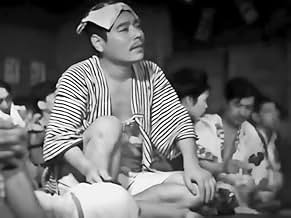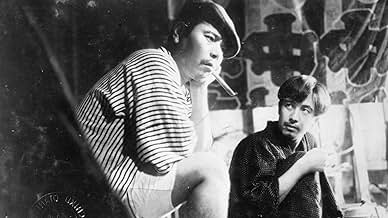IMDb-BEWERTUNG
7,2/10
1537
IHRE BEWERTUNG
Füge eine Handlung in deiner Sprache hinzuTwo Tokyo co-workers come across a destitute young lady in search of a place to live.Two Tokyo co-workers come across a destitute young lady in search of a place to live.Two Tokyo co-workers come across a destitute young lady in search of a place to live.
- Regie
- Drehbuch
- Hauptbesetzung
- Auszeichnungen
- 1 wins total
Den Ôhinata
- Jiro
- (as Den Obinata)
Tomio Aoki
- Tomio
- (as Tokkan Kozô)
Chishû Ryû
- Man on boat
- (Nicht genannt)
Hideo Sugawara
- Boy Taunting Tomio
- (Nicht genannt)
Ausgewählte Rezension
"Passing fancy" (1933) is the latest of the three "silent Ozu's" that I have watched recently (the others were "Tokyo chorus" (1931) and "I was born ... but" (1932)) and the most recent one. Despite the coming of sound Ozu still adheres (just like Chaplin) firmly to the silent tradition. In his view silent film was on his way to reaching perfection and this was threatened by the still infant and imperfect sound technology. "Passing fancy" has many slapstick elements. See for example how characters in this film scratch their buttocks to express uncertainty and discomfort.
"Passing fancy" is of al three silent Ozu's the one with the most contrast to his later oeuvre.
It is about a young son and an adult father in stead of about an adult son and elderly parents. The father is single. The father is working class and not middle class.
Apart from the father-son relationsship there is also a love triangle in this film. In his favourite pub one night there appears a young lady. The father inmediately falls for her charms, but his younger colleague does not trust the lady. Of course the lady herself prefers the younger colleague. The father does ridicule himself courting someone half his age and in the proces neglects his son. Halfway the film one wonders if the father is raising his son or the other way round.
At the end the father, who is pretty good in fooling himself, has ultimately to come to two conclusions. In the first place that he is too old for the young lady (who calls him "a nice uncle", at first much to his chagrin) and in the second place that he has been a lousy father.
Takashi Sakamoto plays the somewhat naive and not very clever father in such a sympathetic way that the next year he returned as the main charecter in Ozu's real breakthrough film "A story of floating weeds".
"Passing fancy" is of al three silent Ozu's the one with the most contrast to his later oeuvre.
It is about a young son and an adult father in stead of about an adult son and elderly parents. The father is single. The father is working class and not middle class.
Apart from the father-son relationsship there is also a love triangle in this film. In his favourite pub one night there appears a young lady. The father inmediately falls for her charms, but his younger colleague does not trust the lady. Of course the lady herself prefers the younger colleague. The father does ridicule himself courting someone half his age and in the proces neglects his son. Halfway the film one wonders if the father is raising his son or the other way round.
At the end the father, who is pretty good in fooling himself, has ultimately to come to two conclusions. In the first place that he is too old for the young lady (who calls him "a nice uncle", at first much to his chagrin) and in the second place that he has been a lousy father.
Takashi Sakamoto plays the somewhat naive and not very clever father in such a sympathetic way that the next year he returned as the main charecter in Ozu's real breakthrough film "A story of floating weeds".
- frankde-jong
- 11. Dez. 2020
- Permalink
Handlung
WUSSTEST DU SCHON:
- WissenswertesYasujirô Ozu regular Chishû Ryû has a small role towards the end of the film as a fellow passenger on board a ship, playing an uncredited "Man on Boat".
- PatzerKihachi states that 50 sen to a boy his age (referring to Tomio) is like 10 ryo to him and Otome. The ryo was replaced by the yen in 1871, over 60 years earlier. (The yen replaced the ryo at par; there are 100 sen to the yen.)
However, Otome then says, "No, more like 1,000 yen!" So, it's possible "ryo" was still being used synonymously with "yen" over a half-century later.
- VerbindungenFeatured in Transcendental Style and Flatulence (2017)
Top-Auswahl
Melde dich zum Bewerten an und greife auf die Watchlist für personalisierte Empfehlungen zu.
Details
- Laufzeit1 Stunde 40 Minuten
- Farbe
- Sound-Mix
- Seitenverhältnis
- 1.37 : 1
Zu dieser Seite beitragen
Bearbeitung vorschlagen oder fehlenden Inhalt hinzufügen
























